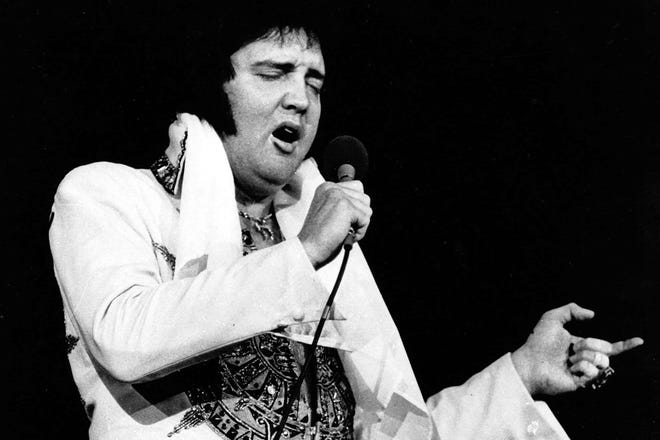Elvis was mocked for his well being issues. We should always have proven empathy

Table of Contents
- Because the King of Rock ‘n’ Roll, Elvis was idolized, however later mocked after displaying well being issues.
- Films like “Elvis” painting the star past his music to showcase his flaws, desires and humanity.
- Opposite to standard perception, celebrities aren’t resistant to psychological well being issues.
- Specialists say it is essential to deal with stars with empathy and compassion, quite than ridicule.
When Elvis catapulted into fame along with his legendary pompadour and pelvic gyrations, America swooned. The King of Rock ‘n’ Roll shocked prudish Fifties America along with his hip swiveling and unprecedented appeal and was handled as an icon – till his tragic ultimate years.
Quite a few documentaries have uncovered the deadly value of fame for Elvis, who wasn’t the healthiest of eaters and more and more relied on medicine to each sleep and carry out. And along with his grueling recording and live performance schedules, many speculated that he was struggling with isolation in Graceland in addition to the pressures to excel after his hiatus in the Military and the booming recognition of The Beatles.
As soon as he strayed from his picture-perfect, seductive picture, some ridiculed and discarded him. Since he died 45 years in the past, he has change into the butt of “fats Elvis” jokes and continues to be mocked over the circumstances of his demise. (In accordance with the medical expert’s report, the singer died of hypertensive heart problems at 42.)
However now, “Elvis” (in theaters) strives to humanize the legendary singer past his musical talents. Austin Butler stars because the American heartthrob via the years: as a rocking teen who ultimately spirals underneath the crumbling stress of success, cash and energy.
“I spotted this man was as iconic as they arrive, and but he after all was a human being, delicate and susceptible, with virtues and flaws, and I obtained to expertise all of that,” Butler mentioned in a USA TODAY interview.
‘I could not be an imposter’:How Austin Butler vanished into the position of Elvis Presley

Psychologists say efforts to reimagine celebrities as greater than their stardom and wealth reach destigmatizing and humanizing the psychological well being dialog.
“We tended to deal with Elvis as somebody who was imagined to be a really fantastic icon of American rock and roll. As he started to age, his psychological well being issues started to floor and other people did not know what to make of that, as a result of many assume that sort of individual must be impervious to human points,” says Carla Manly, a medical psychologist and creator of “Pleasure from Worry.”
Evaluate:Austin Butler guidelines because the King, however Baz Luhrmann’s ‘Elvis’ is an unchained mess
As an alternative of being proven compassion, Elvis was mocked and ridiculed. Why?
Elvis embodied fashionable American youth and rock ‘n’ roll, altering the course of standard music along with his songs, dance strikes, charisma and wardrobe.
However particularly in his later years, he developed a variety of phobias and obsessions, had hassle sleeping and regularly relied on medicine to get via the day. And quite than being proven empathy, he was mocked by the nation that lifted him onto the pedestal.
Specialists say it’s normal for folks to detach celebrities from actuality and snort at them for leisure and amusement.
However Donna Rockwell, a medical psychologist specializing in superstar psychological well being, says the cultural mockery of imperfect stars speaks to “part of human nature we’re not notably happy with.”
“We do not need celebrities to really have that picture-perfect life. … We actually aren’t blissful for them, as a result of we would like that life, too, and we won’t get it,” Rockwell says. “So once we see a celeb altered in any method, we will say ‘Oh, see, they faltered,’ or ‘They don’t seem to be excellent.’ And we like to criticize the superstar to deliver them again right down to our degree.”

Interview:Carson Daly says he is suffered from nervousness, panic assaults on ‘The Voice’
TV:Classes for all of us in ‘The Kardashians’ finale
Manly provides the objectification of Elvis additionally performed a job on this mistreatment: not solely was he used as a “moneymaking machine” by power-hungry leaders within the business, however he was additionally sexualized and decreased to a picture by his younger feminine followers.
As quickly as we start to objectify actual folks, “we fully take away the person’s character, their true selves. We do not know what their fears are, what their hopes are, what their desires are, what their disappointment is. We simply see no matter we would like,” Manly says.
“When Elvis was doing effectively, folks have been projecting onto him the rock star, sexual picture … then as he started to grow old and he misplaced the luster, folks have been now not seeing him as a intercourse image, as the person of America, however they noticed him as a deteriorating rock star. And they didn’t like that.”
Remembering Elvis:Listed below are his 10 hottest hits
Dependancy, constipation and coronary heart issues: However here is how the followers might have performed a job in Elvis’ downfall
To at the present time, conflicting speculations encompass Elvis’ demise. However in line with “Elvis,” overwhelming demand from followers performed an element in his fall.
Some consultants agree Elvis might have been acting at a feverish tempo to satisfy followers’ calls for on the expense of his well-being. The stress to carry out, the lack of privateness and the incessant public scrutiny also can trigger nervousness and despair – leaving some to deal with medicines, alcohol or different substances to scale back stress.
“Individuals change into agoraphobic. They do not need to exit. Why would you need to exit and have folks observing you and judging you on a regular basis?” says Rockwell, including that “a lot is given away when an artist turns into well-known that they’re ill-prepared for.”

‘Stan’ tradition:must cease – or at the very least seriously change. Here is why.
Extra:Austin Butler’s ‘Elvis’ appearing classes started when Tom Hanks delivered a typewriter to his door
With regards to public figures and psychological well being, Manly notes that it’s usually troublesome for these always within the highlight to hunt assist.
“Individuals suppose: ‘Oh, you are a star or you’ve cash. Subsequently, you have to be blissful. You’ve all the cash on the planet. How might you probably have issues? … If you happen to’re depressed, go see a therapist or examine your self into rehab if it’s worthwhile to.'”
However within the case of Elvis, Manly notes, it will have been “a lot harder than your common Joe, who is not nervous about how folks shall be taking a look at him.”
“Ultimately, someone who has a psychological well being situation, who’s a celeb, will usually have a harder time as a result of to actually efficiently recuperate from a psychological well being drawback or dependancy, you really want a substantial amount of humility. And that is one thing that individuals who have wealth or fame have issue stepping into.”
Britney Spears had her trauma exploited:What it means to lastly hear her aspect.
We might have failed Elvis. What must be performed sooner or later?
In recent times, Hollywood has tried to unfold consciousness in regards to the human facets of celebrities. Except for “Elvis,” new retellings like Netflix’s “Blonde,” starring Ana de Armas, “discover the widening cut up between (Marilyn Monroe)’s private and non-private selves.”
These efforts don’t proper the wrongs of the previous. However once we see the complexity of stars past their fame and fortune, “the general public is then pressured to see them as human,” Manly says.

“It is harder to undertaking onto someone who’s exhibiting their fault traces. It is harder to undertaking onto that individual that best of perfection.”
Having studied the psychology behind fan-celebrity relationships for greater than 20 years, Rockwell says, she has noticed a rising tradition of empathy and compassion from the youthful era. She credit this to public figures like Selena Gomez, Billie Eilish and Michael Phelps, who use their platforms to share their struggles and assist scale back psychological well being stigma.
Selena Gomez on the White Home:Why psychological well being is ‘private’ for the singer, actress

“What’s going to create a greater and extra empathic relationship between followers and celebrities is extra celebrities empowering themselves to talk out about their genuine being,” Rockwell says. “I believe that youthful folks as we speak are actually responding to vulnerability in ways in which an older era simply didn’t.”
Harry, Meghan, The Rock, Naomi Osaka:Why superstar psychological well being struggles matter
Contributing: Marco della Cava

